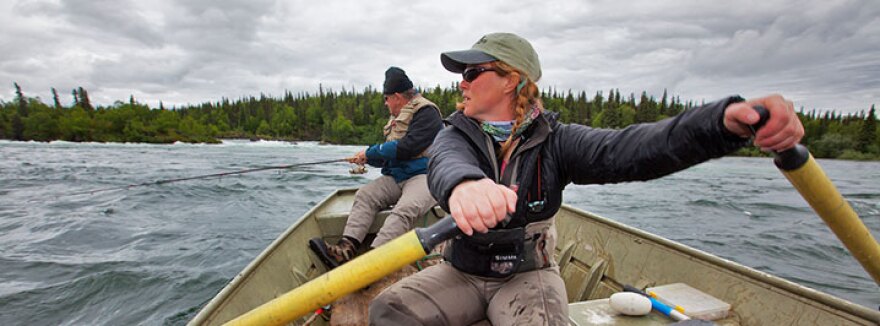A group of Western Alaska lodge operators say Alaska should be exempt from a new rule that requires 90 days of sea-service time for each body of water.
Bristol Bay lodge owners are asking the U.S. Coast Guard to change a regulation they say is unfair to sport-fishing operations in remote parts of Alaska.
The new rules change the requirements for a type of guide license that used to be good on any freshwater in Alaska, and limit that license to a single body of water.
If you want to be a fishing guide on lakes and rivers regulated by the U.S. Coast Guard, you can get two different levels of six-passenger (called a "six-pack") license. There’s the restricted and unrestricted Operator of Uninspected Passenger Vessel (ROUPV or OUPV) licenses.
The big one is the unrestricted six-pack (OUPV), which has not changed – it still requires a full year (360 days) of sea-time, and then you can operate on any inland waterway in the United States.
What’s changed under new Coast Guard rules is the restricted six-pack license, also known as the ROUPV.
“So the old ROUPV is the one that you could do 120 days of service and get a license that’s good on any freshwater in Alaska," explained Lieutenant Commander BrierleyOstrander with the Coast Guard Sector Anchorage.
Ostrander explained the new restricted license will require three months of sea time on each "navigable waterway," which includes all rivers and lakes that lead to a single drainage.
"Basically they have to have 90 days of experience on the particular body of water that they have the license for."
The Coast Guard did create a phase-in period to account for people who got a start on their sea-time before the rule changed in 2014.
“If somebody has had at least one day of experience on the water prior to March 24, 2014, they have this third option, where they can get 120 days of experience anywhere," said Ostrander, "and then they can choose three bodies of water to have on their license.”
That transitional option is good for another three years, and lodge owners like Bud Hodson of the Tik-Chik Narrows Lodge are grateful for that buffer time.
But after 2019, Hodson says, the new rule will be unfair to guides just getting started in Western Alaska.
“For example, if you grew up in Aleknagik and you boated in the Wood Tik-Chik State Park, you would qualify for that but you couldn’t guide in Togiak, you couldn’t guide on the Goodnews, you couldn’t guide anywhere in east Bristol Bay," Hodson said. "So then if you were working as a fishing guide, how would you ever get 90 days on a body of water that you’re not licensed to work on? So it would be really prohibitive."
"It’d be like saying okay, you’re gonna be a plumber, we’re gonna license you, but you can’t get a job in Anchorage or Nome or Kotzbue. Because you did your experience in Dillingham so I’m sorry, you can only be a plumber in Dillingham," said Hodson.
Hodson and other Western Alaska lodge operators have gotten together to fight what they see as a discriminatory rule. They’ve hired an attorney to petition the Coast Guard to exempt Alaska from the “90-day rule.”
“We would like to go to what we call the old rules, when it was 120 days of sea-service time anywhere in the United States.”
It will require support from the industry and Alaska’s congressional delegation, but Hodson is fairly confident his sport fishing coalition will succeed.
“Personally, with our argument and the reality of Alaska and our needs, I can’t see the Coast Guard having a lot of pushback," said Hodon. "It would surprise me if they did.”
Hodson expects the petition could take a year or more to resolve.
Of course, there’s always the option of getting the full, unrestricted six-pack license (OUPV). According to the Coast Guard, aspiring guides can start logging their 360 hours of sea-service time anytime they’re driving a boat after their 16th birthday.
To track their sea-time, operators should log the date, the time underway, the length and type of boat they were on, the boat's horsepower, and the boat's state registration number.
Any questions about how to prove time on the water can be directed to the Anchorage Regional Examination Center at (888) 427-5662.


